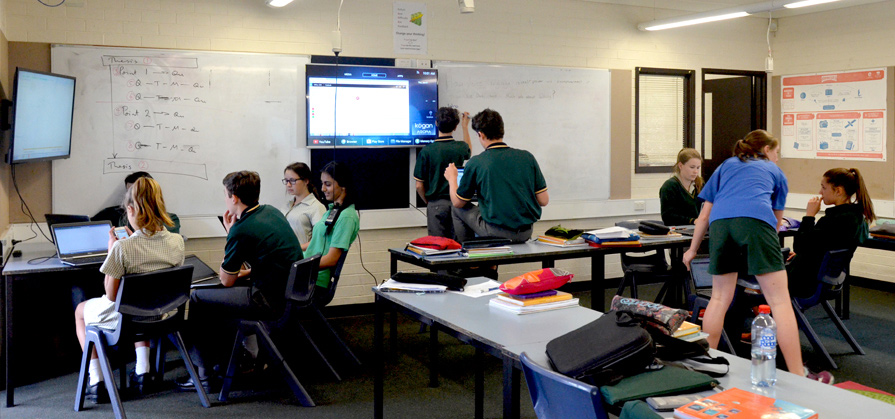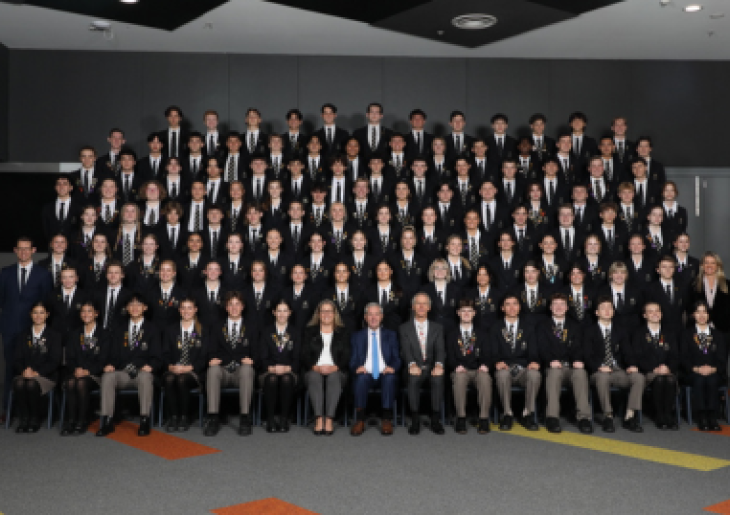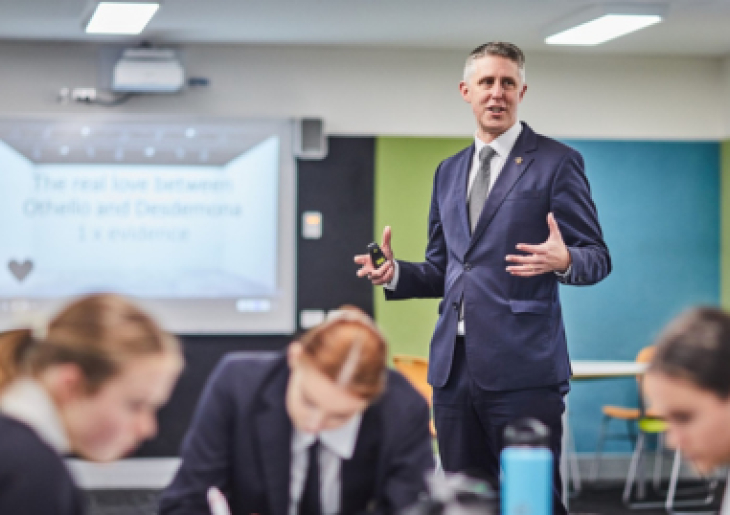Next level collaboration
Today’s students are ‘digital natives’ and 21st-century learners. They’re growing up in a world where digital devices have existed their entire lives. We need to look beyond traditional classroom processes, structures and spaces and reimagine classroom designs that enhance next generation learning.

The English Department has been trialling new Digital Collaboration Zones (DCZ) to offer exciting possibilities for collaboration. “Our students are the inventors of the future, so we need to ensure they thrive in learning,” says Damon Cooper, Director of Teaching and Learning. “We’ve acknowledged our digitised youth and considered how we could find more creative and customised ways to get students collaborating and thinking with more engagement and curiosity. Our solution was to introduce new digital tools within a more suitable collaborative environment.”
What are digital collaboration zones?
Each Digital Collaboration Zone consists of a whiteboard for students to brainstorm big ideas, laptops for individual research and large screens so students can bounce ideas off each other and work together on digitally collaborative projects.
How do DCZ's benefit learning?
“English students have always worked in cooperative groups and they still require the same skills they have always needed,” says Damon. “The challenge for teachers is to continue to facilitate purposeful collaboration in our changing learning environment.”
“Students are more engaged because the learning is personalised, interactive and integrated into their everyday life. By drawing on their digital skills and the digital tools they use every day, we’re bringing their online world and online skills into their classroom and making the learning challenge more relevant to them," said Damon.
We're moving students form online communicators to online collaborators - Damon Cooper, Director of Teaching and Learning
The DCZ’s do more than just digitalise group work, they create brand new ways to collaborate. Students can quickly and easily find information online and share it with the group, they can see each other’s research and can bring their ideas together to create a response. “When I can see what other people in my group are thinking, I can reflect on my own ideas more or offer suggestions on things they may not consider,” said one Year 9 student. “It’s a better experience, and I feel like we’re all on the same page.”
Not only do the DCZ’s help students but they assist teachers to make learning visible for assessment. “We can easily assess student’s level of understanding because their train of thought is evident,” says Damon. “We can see what’s challenging them and how they are developing their ideas and can provide immediate on-the-spot feedback.”
Why does digital collaboration matter?
It’s a big, ever-changing and connected world and collaboration is a required skillset for the future. The quality of students thinking processes and content understanding improves when they can discuss and share ideas with others. These skills are important in the classroom and critical as students enter a more globalised workplace.
The existing barriers of time and location are becoming redundant with the digital exchange of ideas and knowledge across communities, countries and continents. “Collaboration is an important function of many professions,” says Damon. “Our students may one day work for many employers at the same time, doing many jobs and be required to collaborate with colleagues from all over the world- whom they may never meet in person! Enhancing the communication and interpersonal skills required to work in this way is so important for 21st-century thinking and workforce readiness.”
Support for DCZ from our school community
This year the CCGS Parents and Friends introduced a new initiative to promote innovation in teaching and learning by providing grants totalling $12,000. The English Department was successful in securing some of this funding to expand its Digital Collaboration Zones.
“The P&F usually provide funds to improve the physical capital of the school - which of course is paramount in enhancing the learning environment,” said Geoff Dent, P&F Member. “This is an opportunity for seed funding to develop great ideas further in the school.”
“The P&F grants go a long way in building the learning capacity of teachers and students across the entire school,” says Damon. “Investing in innovation fosters innovation and nurtures new and emerging approaches to teaching and learning which can only benefit our students beyond school.”




